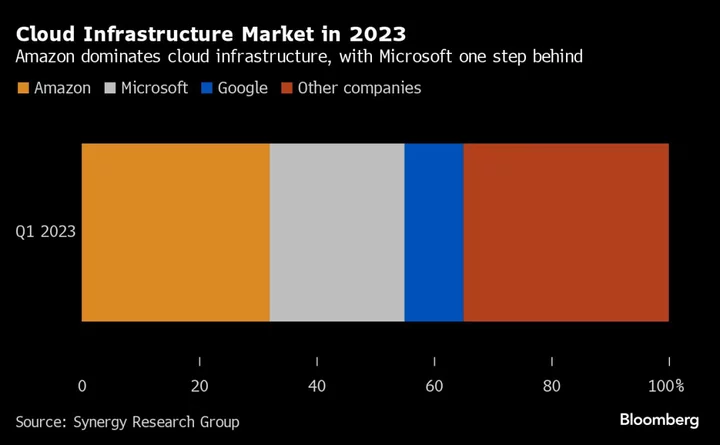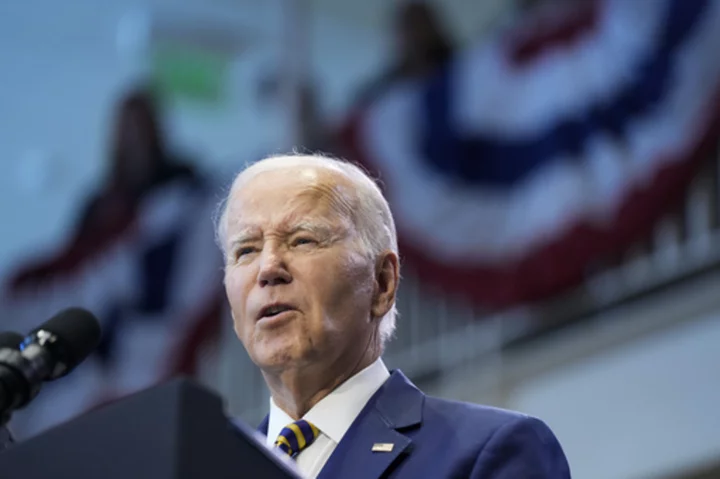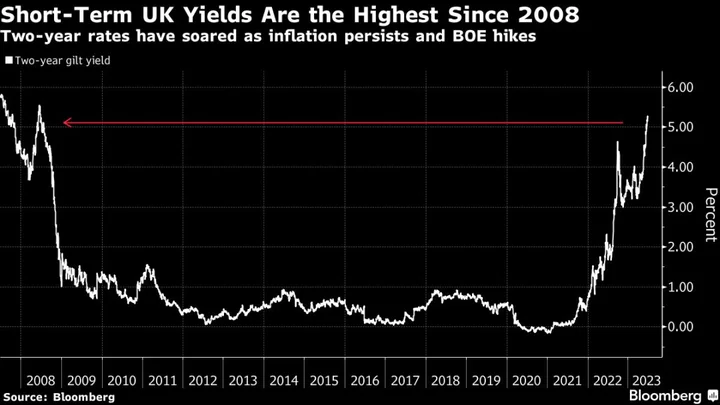Amazon is the driving force behind a trio of advocacy groups working to thwart Microsoft's growing ambition to become a major cloud computing contractor for governments, a Bloomberg analysis shows.
The groups — the Cloud Infrastructure Services Providers in Europe (CISPE), the Coalition for Fair Software Licensing and the Alliance for Digital Innovation — want to convince policymakers that Microsoft has improperly locked customers into Azure, its cloud computing service, choking off its rivals and hindering the advancement of technology within the government and beyond.
These groups have dozens of members. But Amazon is the biggest funder for two of them and the largest company, measured by revenue, that funds another.
Spokespeople for the groups say no single company determines their agendas. But according to a Bloomberg News review of tax filings, documents and interviews with people familiar with the three groups’ operations, Amazon Web Services plays a direct role in shaping their efforts in ways that would boost the cloud giant.
Through aggressive lobbying of policymakers, these groups want to ensure that customers can use popular Microsoft products like Office Suite or Windows on any cloud computing system — and, in particular, on Amazon Web Services, the world’s number one cloud infrastructure provider and the retail giant’s top profit driver.
To hammer that message, they’ve filed complaints, lobbied regulators and sought to shape the views of policymakers probing the cloud market. In one case, an Amazon executive is listed as the author of a public comment to the Federal Trade Commission, as well as testimony and letters to Congress on behalf of the group, according to an analysis of the documents' metadata, revealing the tech giant’s role in the lobbying campaign. (The group says the documents reflect the consensus position of its members.) Amazon denied it authored statements for the group.
“Enterprises in every major industry have long worked with trade associations,” Shannon Kellogg, an Amazon spokesperson, told Bloomberg, adding that AWS supports dozens of trade associations as well as CISPE, the alliance and the coalition. “Our work with trade associations is driven entirely by doing what’s best for our customers, and to suggest otherwise is entirely false,” Kellogg said.
In recent months, regulators in the EU and UK have investigated whether Microsoft has engaged in anti-competitive behavior in the cloud market. In the US on Thursday, the FTC is expected to publish initial findings of a comprehensive competition review of the cloud computing industry — a review Amazon is influencing both directly and through the groups.
“We are investing and working to meet and exceed customer expectations, while Amazon is spending its time and resources creating proxy groups to lobby government,” said Becca Dougherty, a spokesperson for Microsoft.
Both Amazon and Microsoft are betting that public-sector cloud computing will be the tech industry’s next big money maker: Bloomberg Intelligence estimates the US cloud market could reach $1.3 trillion by 2027, up from $532 billion in 2022.
Microsoft looms large in federal contracting thanks to its Office suite and Windows operating system. Over 80% of federal government workers use Microsoft’s business software. Like Amazon, Microsoft also funds outside groups that lobby policymakers.
Amazon, meanwhile, has made its own inroads with government clients thanks to AWS, which companies and government agencies use to store information and run other applications. In that arena, AWS has nearly twice the market share of its nearest rival, Microsoft's cloud Azure, according to estimates from Gartner.
Since 2016, Microsoft’s customers and rivals, as well as regulators around the world, have complained that the company makes it more expensive and cumbersome to run its programs and services on rival cloud providers. That locks government users into Microsoft’s cloud, even if they might want to switch to Amazon or other cloud providers.
Microsoft said there is ample competition in the cloud computing market.
In the federal government, bureaucratic red tape makes it even harder for people to switch cloud providers, said Steven Weber, a professor at the University of California at Berkeley School of Information. “Amazon would be in a better place if there were free and open competition for cloud services,” he added.
In Europe
Since CISPE’s founding in 2016, European cloud providers have regarded it as an effective industry advocate. According to CISPE documents, its founding members included OVHcloud, Aruba, and Amazon Europe, its largest founding member based on revenue. Microsoft is not a member.
CISPE members with annual revenues above $500 million like AWS and Aruba pay about $30,000 in annual membership dues, according to spokesman Ben Maynard (OVHcloud is no longer a member). Because the group makes decisions on a majority basis, it’s “impossible for any one organization to dictate the workstreams, outputs or positions of CISPE,” he added.
Amazon has made additional contributions to CISPE to fund “specific initiatives,” Maynard said, including data protection, diversity, and sustainability. He declined to specify whether it has given more money to those initiatives than other companies.
In April 2021, CISPE published a white paper calling on Microsoft to allow its customers to use software like Office on a wider range of cloud providers.
CISPE ramped up the pressure the following year, filing an antitrust complaint against Microsoft with Europe’s top competition regulator, alleging it had made it difficult for customers to change their cloud providers by tying its business software to its cloud.
In May 2022, Brad Smith, president of Microsoft, conceded some of CISPE's criticisms of its fair licensing rules and promised that the company would "absolutely make changes soon to address them."
By April 2023, CISPE claimed victory, announcing a potential settlement with Microsoft that would enable customers to switch more easily to other cloud providers including Amazon.
At the FTC
In the US, the FTC is reviewing whether companies are playing fair and protecting customers in the cloud computing industry.
In May, the FTC held a workshop as part of that review. It featured a handful of academics and experts with insight about cloud computing, including Frederic Jenny, who presented CISPE-funded research showing that Microsoft’s practice of charging customers additional licensing fees to use its Windows and Office software potentially violates antitrust laws.
“People who are supported by large companies with big market power in certain areas we’re looking at have every right to comment on how we should think about those markets,” FTC spokesperson Douglas Farrar said.
Amazon is also a major funder and shaper of the Washington-based Coalition for Fair Software Licensing, according to two people familiar with the group, which does not publicly identify its members. Amazon has previously disclosed its involvement with the group.
In September 2022, the coalition released a proposed set of software licensing rules, which appeared nearly identical to those released by CISPE the previous year. Alphabet Inc.’s Google and a range of tech industry-backed trade groups endorsed the coalition’s proposal.
Amazon is also the primary funder of the Alliance for Digital Innovation, a trade group whose 27 members include Google and Salesforce; Microsoft is not a member. The alliance lobbies the US government to move its operations to the cloud and has filed comments as part of the FTC process.
While the alliance has disclosed AWS’s membership, it has not disclosed that it is its primary funder, according to two people familiar with the organization.
The alliance’s messaging reflects the company’s cloud computing priorities and its ranks are peppered with current and former Amazon executives. Jeff Kratz, an AWS vice president, sits on the alliance’s board of directors. And a public sector policy head at AWS authored the alliance's public comment to the FTC, along with two of the group’s letters submitted and congressional testimony from 2020, according to a Bloomberg analysis.
In a statement, Amazon denied any role in authoring these documents.
“The Alliance’s policy positions and related documents are developed, written, and edited by its staff,” said a spokesperson for the alliance, who declined to be named. “Members are provided with the opportunity to review, comment, and contribute to drafts, with the final products reflecting this input and the consensus positions of our membership.”
(Updated with Microsoft’s concession, Amazon’s disclosure of its ties to the coalition and attribution in final paragraph.)









